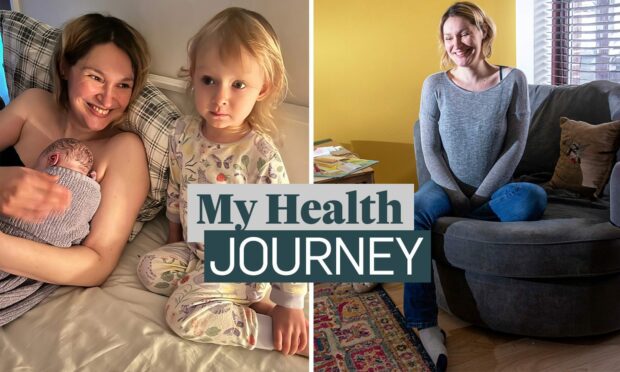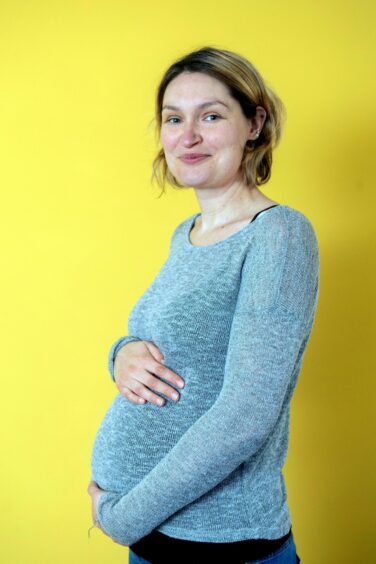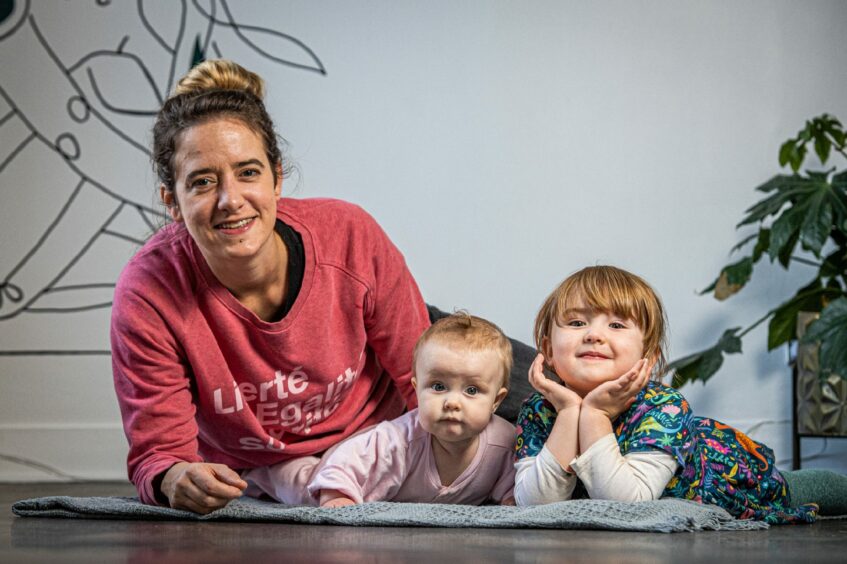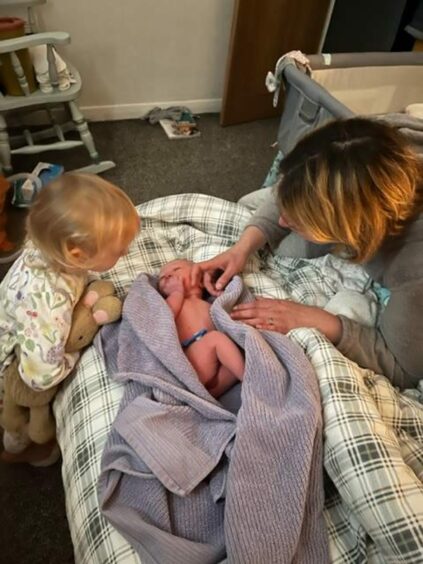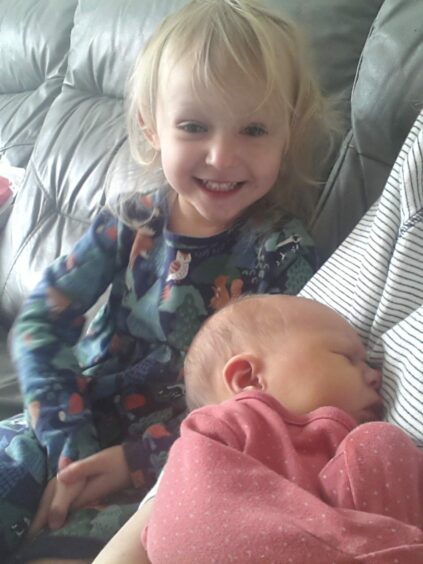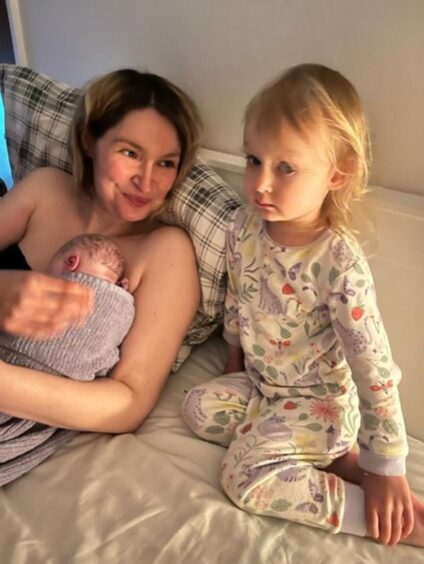Louise Healey is at home in Westhill, cradling a baby bump and recalling a pivotal moment during the delivery of her second child.
It was when Arleen Cameron, Louise’s professional birthing partner, offered her a drink with a straw.
It was a tiny detail, especially when compared to everything else Arleen did that night.
Making sure the midwife had everything she needed, for example, and that daughter Isabel was cared for.
But, more than 12 months later, the simple act of sticking a bendy straw in a cup and directing it into her mouth continues to stick out.
“It sounds so stupid,” says Louise, who catches her breath as the emotions of the night come flooding back.
“But I didn’t have to adjust my position, I didn’t have to take a time-out from what I was doing. Not having to think about whether I was thirsty or needing a drink other than giving a yes or a no – it was remarkable.”
That Arleen knew to use a straw came from years of being by the side of expectant mothers.
The 38-year-old is a professional doula, a role she describes as a “non-medical layperson” – someone who can provide support before, during or after pregnancy.
Her job is to both literally and figuratively hold the hand of women as they give birth, and serve as an advocate for a person who at times may not be able to speak on their own behalf.
“I help people stick up for themselves,” she say.
‘She is like a knowledgable friend’
For about a year, Arleen has run her doula business, called Rebel Birth, as a paid service, helping dozens of women navigate the practicalities and emotions of giving birth.
Mum-of-two Arleen specialises in hypnobirthing, which uses breathing techniques and visualisation methods to relax the body and cope with pain.
She often works with NHS midwifery staff to give her customers the birthing conditions they want, whether it’s at their home or in Aberdeen Royal Infirmary’s birthing centre.
“She is like a friend who is just really knowledgeable and patient to listen to you stuff that you wouldn’t normally take to friends,” explains Louise.
Bringing doulas to Aberdeen’s most vulnerable
Now, Arleen is widening her services to beyond the people that can afford to pay for it.
With four fellow doulas, she has launched a not-for-profit community group called the Aberdeen Birth Collective.
The group, funded by donations and grants, will give free doula care to vulnerable people in society, for that period in their lives when they are at their most vulnerable.
For Arleen, the support she can give to birthing mothers is vital in combatting what she calls birth trauma – a condition that can come from a difficult birth and which is more likely to happen to people in marginalised communities.
“Black women are nearly five times more likely to die in childbirth or postnatally,” she says.
“People with multiple vulnerabilities are something like two-and-a-half times more likely to have poor outcomes. And the biggest killer of women post-natally is suicide.”
According to Arleen, birth trauma can happen to women who find themselves “on a conveyor belt of care”, where they are taken from one medical treatment to another.
Vulnerable women, who perhaps have no family members to fight their corner, are, she says, more likely to succumb to the conveyor belt.
“This is the medical management of births,” Arleen continues. “And for a lot of people, that’s traumatic.”
A landmark for the Aberdeen Birth Collective
Back in Westhill, Louise is days away from giving birth.
Her pregnancy is a landmark for Arleen’s Aberdeen Birth Collective as it is the first to be overseen by the not-for-profit.
Meanwhile, Louise has a unique perspective on ABC because her first child, Isabel, was delivered solely under NHS care while her second – Henry – was supported by Arleen alongside an NHS midwife.
Louise is an ideal candidate for the first ABC delivery because both her and her husband don’t have family members who can support them.
Meanwhile, Louise’s husband is often away from home because of his work.
As such, she is in high need of Arleen’s expertise and coaching.
“This time around is very different financially,” says Louise.
“I would have really struggled this time if Arleen didn’t offer this service.”
‘There’s a real spilt among mums’
Both Arleen and Louise are aware that choosing a particular way of giving birth can be a contentious issue among women and healthcare professionals.
“I would say from the mums I’ve known that have become a mother there’s a real split,” Louise says. “There’s some that prefer that medical management and there’s the other degree where people want absolutely no intervention.”
Meanwhile, Arleen knows the common perception of a doula is “meditation and essential oils and stuff”.
But she is keen to shake off that image. For her, the Aberdeen Birth Collective is about “advocacy and helping people to learn what their rights are”.
Does she even have essential oils?
“I do,” says Arleen with a laugh. “I tick those boxes. But I find that I rarely use them. The kind of client that wants that often has their own.”
Louise also champions a woman’s right to have the birth she wants. And as someone who has been helped by a doula already, she is looking forward to having Arleen around for her next birth.
“Even just that stillness of decision making,” she says. “It doesn’t really matter what you’re choosing. It’s just being able to be in control of your choices.”
A successful outcome for Louise
In the end, Louise’s birth went without a hitch. Baby Piper was born in the family home Isabel and Henry scurried around downstairs, excited to welcome their new sister.
Much to Louise’s delight, she was able to spend her recovery at home, without the need for a hospital visit.
It was a clear success. Even so, doula Arleen has her own measure of whether she has done her job.
“With any birth, it doesn’t matter whether it’s a home or in a midwife unit in hospital,” she says,” it’s about people being listened to, and having their birthing preferences met.”
